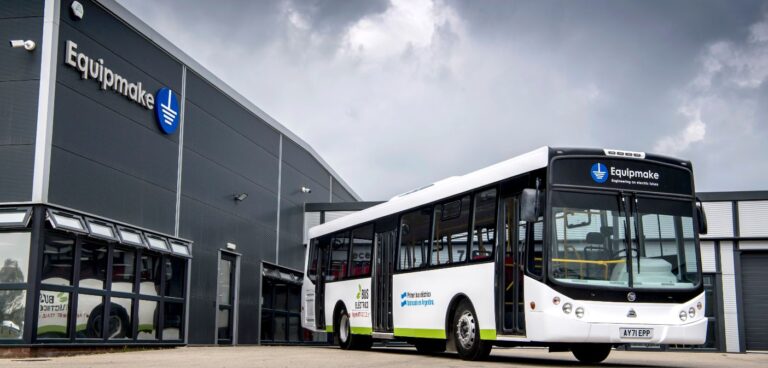Following the completion of UK tests, Equipmake’s latest electric bus has begun a journey from Norfolk to Buenos Aires.
It marks the first overseas road-based trial of an Equipmake e-bus, with the 12m (39ft) single-decker expected to start operating in Argentina’s capital in Q3 2022.
The vehicle was produced as part of Equipmake’s Advanced Propulsion Centre-funded CELEB (Cost Effective Low Entry Bus) project, which aims to deliver efficient and affordable buses for the South American market.
Collaborating with Brazilian bus manufacturer Agrale and Argentinian coach-builder Todo Bus, Equipmake developed an electric version of the Agrale MT17.0LE single-decker, using its zero-emission drivetrain (ZED).
During the past year, Equipmake tested the e-bus via a durability programme in and around Norfolk, with reportedly thousands of test miles completed over a variety of terrains.
According to test data, the new e-bus will have an estimated range of 150 miles (240km).
The new model can hold 70 passengers and will be operated over the next year by DOTA S.A., one of Buenos Aires’ largest bus operators.
Following the successful completion of the trial, the objective is for mass manufacture to begin in Buenos Aires with Agrale and Todo Bus, using licensed Equipmake ZED technology.
Ian Foley, managing director of Equipmake, said: “On behalf of everyone at Equipmake I am delighted that, following the completion of final testing here in Norfolk, the Agrale MT17.0LE featuring our ZED system, now begins its journey to Buenos Aires for in-service trials.
“We are now looking forward to the start of the trial and the potential for this new vehicle is huge.
“Buenos Aires has around 16,000 buses on its streets – roughly twice the size of London’s fleet.
“There’s no doubt that electric buses can play a significant role in helping Argentina’s capital hit its 2050 net zero objective.”
Equipmake’s ZED system reportedly enables the re-power of almost any type of bus, offering up to five repowers a week following a compatibility inspection.
The company claims that this re-power programme also makes financial sense, with each conversion apparently coming in at less than half the price of a new e-bus.





